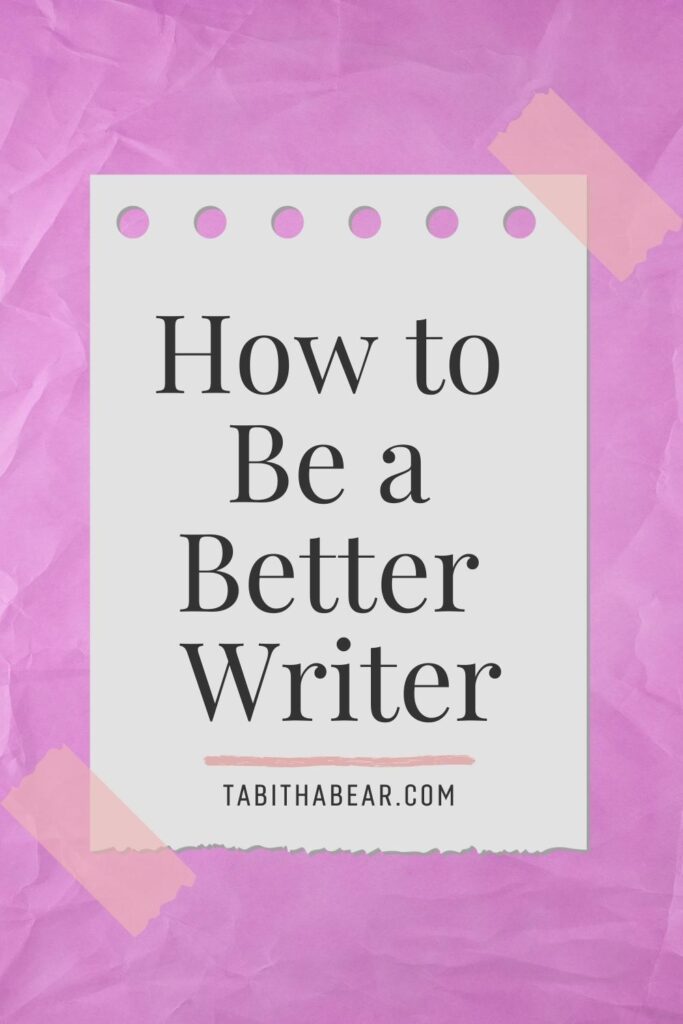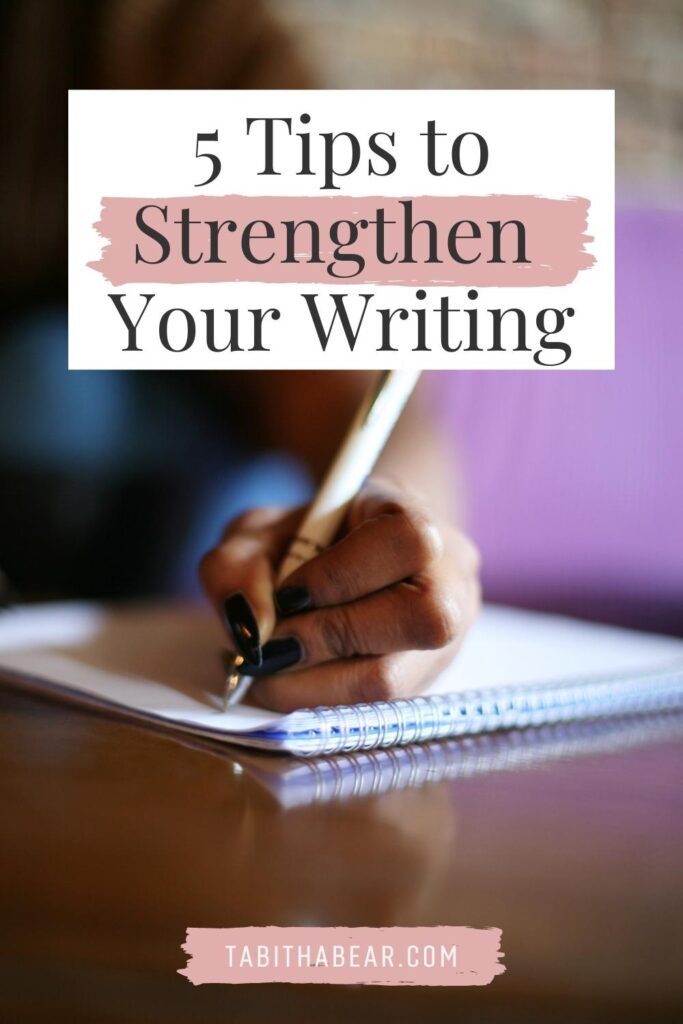
If there’s a book you really want to read, but it hasn’t been written yet, then you must write it.
Toni Morrison
Here are 5 writing tips for beginners you can absolutely start using today to help strengthen your writing. There’s so much that can go in to making you a stronger writer, it gets overwhelming. I crated this introductory post to help you ease into it.
Writing isn’t everyone’s forte, and that’s okay! Punctuation is the nosy neighbor on the block; they just can’t help but show up and put a weird pause on the fun. Vocabulary is the universe; there are 900 gazillion words to choose from – how can you possibly memorize them all? And, when it comes to putting the pen to paper, do you really know what you’re event going to write about?
– Punctuation isn’t as crucial in your first drafts as you might think. Everything gets a facelift and a half during editing and re-writes anyway.
– Vocabulary is not the definition of good writing. Use the words you know and love so well, develop your own use of the language we all share. And if you need to know another way to say ‘tall’, use a thesaurus.
– If you truly don’t know what to write about, write what you want to see available in the world.
Let’s get started!
This post may contain affiliate links. I earn a small commission at no extra cost to you. You can find more about that here.
Read Often
It doesn’t matter what you’re reading, as long as you’re reading. And if you’re going to be reading, you might as well read something that brings you joy. Do you enjoy reading travel essays? Comic books? Young Reader chapter books? Read it. The more we read, the more written language we introduce to our brains.
When I’ve worked with younger students in the past (and my younger self is included in this thought process), they thought the only thing you should read to be come a better writer were the classics, or textbook-esque books discussing the rules of ‘creative’ writing.
No one talks about creative reading, and I think we should. Inspiration blossoms far more frequently when I read what brings me joy than if I were to sit down and study how to become a better writer.
It’s also important, when reading, to disconnect from the world. Put your phone on do-not-disturb, try to hide from the family, ignore social media and work emails… you get the idea.
I’ve brought pillows with me into my bathroom to make the tub more comfortable to avoid family and read for a bit!
Let your brain exercise. Let your imagination cut loose and take you on a journey. Let everything else fall away.
A regular reading habit builds vocabulary, improves your overall writing, focus & memory, strengthens your analytical skills, reduces stress, and helps with sleeplessness. Reading often can also help prevent the decline in brain function as we age.
Write Often
Get the shit out of the gutter. Write whatever just to keep the skill warmed up.
Natalie Goldberg wrote about Writing Practice in Writing Down the Bones: Freeing the Writer Within. This was one of the most helpful books I’ve ever read, and worked with, as an aspiring writer. This book contains so many golden writing tips for beginners – it is a must own!
She makes the point that, if you were to go running or work out at the gym, you’d warm up your muscles first. Before you dive into writing a novel, isn’t it helpful to warm up your writing first?
It doesn’t matter what you write about, just write. I have a notebook specifically meant for whatever. A journal, some notes I want to write out, a to-do list, a reminder, ideas for my business… it’s all jotted down in a chaotic, creative mess.
However, I elaborate on those things. I let my mind wander around with words and get fancy about it. I don’t suppress the language that wants to escape. This notebook is for me to warm up with. It’s not meant to be my Hugo Award winning achievement.
And they must be hard up for good writing if ever one of my notebooks won, because yeeeeeeeesh – they’re bad!
A regular writing habit improves communication and leadership skills, is a mood booster, and can increase your productivity. This is especially helpful if you write down your to-do’s.
Read With Purpose
I emphasize the importance of this section to those who say, “I don’t read a lot. I’m not a good reader. I find it boring.” etc.
Set a goal for yourself. Read 10 pages in one sitting, two chapters in one sitting, read for twenty minutes – it doesn’t matter. Disconnect from the world and accomplish this goal. I firmly believe reading all the time has absolutely made me a better writer. And, the more I read, the more authors and stories I discover. Reading is a beautiful relationship with yourself.
Read about what you want to write about. Inspire yourself. Immerse yourself.
It’s also crucial to read with diversity in mind. Seek out BIPOC authors. Seek out womxn authors, LGBTQ+ authors. Deaf authors. Disabled authors. Become a well-rounded reader. And I rally mean it when I say ‘seek’. For the longest time, it was a hunt to find BIPOC, womxn authors.
I know this may sound like a mild contradiction to what I’d written earlier in this post, but read about writing. It may not sound tremendously fun, but I’ve found it to be incredibly helpful. I love learning about what other authors have to say about writing. And sometimes, those books come with phenomenal little nuggets of advice for your writing, or a sweet book recommendation… you never know what knowledge those books will bring and what great writing tips for beginners they may hold.
Here are a couple of my favorite titles:
Wired For Story by Lisa cron
The Writing Life by Annie Dillar
Writing Down the Bones: Freeing the Writer Within by Natalie Goldberg
Write With Purpose
Schedule time to write throughout your day or your week. Every Tuesday and Thursday from 9AM – 11AM, you’re writing.
This was exceptionally hard for me to do when I started freelancing.
I’d sit down at the scheduled time ad stare at my screen, google random things, make little notes to myself in reference to other things going on in my life, and focus on writing up the grocery list.
I spent a good amount of time staring at the wall wondering what I was doing with my life.
But, each time I showed up and sat down with the intention of writing, the more routine it became for my brain to slowly shut out the world and let the language flow. This didn’t happen overnight, this took quite a few weeks to do. I wasn’t just creating a writing routine, I was breaking the habit of my previous job as well.
There was a lot of patience in this, met with equal parts frustration.
What did help in these situations was to set a writing goal. (Also, partial thanks to Natalie Goldberg and her fabulous book of writing tips for beginners!)
The goal, sometimes, was to write 2500 words over the span of two hours and to try and do this without editing. Without sense.
Not every day pulls much water from the well, of course. Some days I’d pick a topic form my notes, and I’d write about that topic for 15 minutes straight with no interruption. It doesn’t mean it was good. In fact, a lot of it is just absolute crap. But I filled up that 15 minutes with just writing.
The amount of gibberish that has disgraced my monitor is endless…but what matters is I wrote. I met the day’s goal set before me.
Keep Writing
I don’t know what your relationship is with your writing. Maybe you’re trying to write a college paper at 2 AM, maybe you just want to write better in general for you… I don’t know why you’ve come to my little corner of the interwebs.
I will say this:
Regardless of frustration, or lack of challenge, you may have with your writing – keep doing it.
A brilliant novel once started as a good idea in a crap first draft. Keep on writing.
Find more great writing tips for beginners and other stories on the blog!

Never Miss An Adventure.



Pingback: how to write for social media - Tabitha Bear